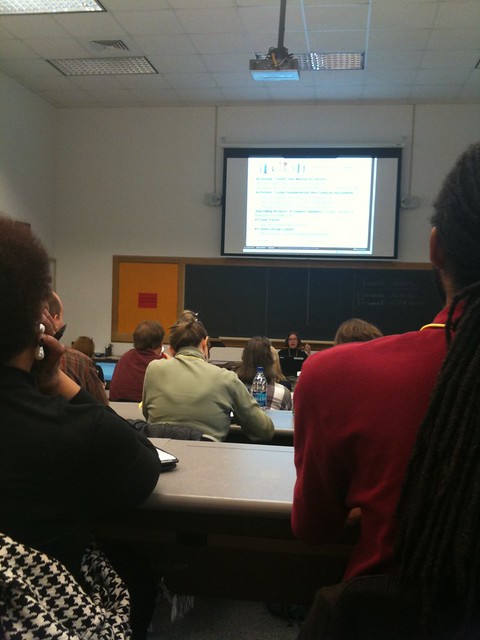This article is more than 5 years old.
*Note: most of this post is duplicated at the ZSR Professional Development blog.
From 10 am this morning until 3 pm this afternoon, Z. Smith Reynolds Library was inhabited by 50 excited archivists and librarians (from across the state and as far away as Texas) to learn about Archivists’ Toolkit. The workshop, sponsored by the Round Table on Special Collections of the North Carolina Library Association and ZSR Library, included in-depth exploration and instruction about the modules of AT: names and subjects, accession records, resource records (finding aids), importing and exporting EAD/MARCXML, assessment records, and statistics.
Katherine started off our session with a warm welcome to the participants and I introduced our speakers. Dale Sauter, chair of the RTSC, also helped organize the workshop and was in attendance. Participant registrations included lunch, which was catered by our on-campus service. Planning the event was worth the effort after seeing 50 eager participants in room 204.
Speakers Dawne Howard Lucas from Duke University and Kacy Guill of ECU incorporated practical explanations of concepts with hands-on demonstrations of the relational database desktop client. Katherine, Megan, Vicki, Julia, Rebecca, Beth, intern Leatha, and I all learned a great deal about some of the additional customizations and tools that will help Special Collections and Archives better describe, prioritize, and measure our archival collections. Some of the reports that AT generates will help us quantify our preservation and processing needs, as well as demonstrate the accomplishments of our department as we complete projects.
Thanks go out to Giz, Susan, and Roz for helping me with the room reservation, Rebecca for helping with setup, and also to Katherine for her warm welcome to the participants. Now that we all have a better understanding of how to use and customize Archivists’ Toolkit to our needs, we are better prepared for a collaborative, streamlined effort to make our archival resources even more accessible!
